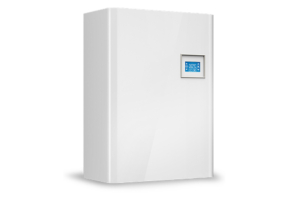What size electric boiler do I need ? Boiler sizing

What size electric boiler do I need? It is a question we are often asked. It may be in relation to a new property or replacing existing gas boilers or oil boilers. The following guide will take you through the process and things you need to consider when selecting the correct size boiler. We supply a full range of electric boilers, which are electric system boilers for central heating, be it for underfloor heating and hot water demands, or for radiators and hot water demands (domestic hot water via an indirect cylinder), or just for electric central heating only. So, if you’re looking for a “what size electric boiler do I need calculator”, keep reading.
Sizing an electric boiler for your home
The first part of selecting the correct electric heating boiler for a wet heating system is the heating load, which is expressed as your kW requirement. It doesn’t matter whether you are using radiators or an underfloor heating system – it’s the same for both, as a heating load is a heating load, as they say!
Here’s a quick chart – for properties built after 1990 that have a ceiling height of 2.7 metres, which is the standard, and an insulation value, or U value, of 0.3 – again, this should be the building standard in the 1990’s and onwards.
You can do this in a couple of different ways –
What size electric boiler chart – quick reference
Power Output of Boiler Heating floor area
4.5 kW ~ 55 m2
7.5 kW ~ 85 m2
9 kW ~ 110 m2
13.5 kW ~ 165 m2
15 kW ~ 180 m2
22.5 kW ~ 278 m2
24 kW ~ 300 m2
As a general rule, for properties built after the 1990’s, you should allow 1.5 kW for each radiator in your home. For example, if you have eight radiators, you should choose a 12kW electric boiler. This rule may change depending on the height of your ceilings, the type of glazing you have (single or double), and the effectiveness of your property’s insulation.
These rules of thumb are a good basis or guideline, but it’s a good idea to confirm this with a heating engineer before you make a potentially costly error, but this guideline will give you a good understanding of the size of electric boiler you require.
Or should you have an older property / home , than prior to the 1990’s such as an older Victorian type home or a property with different construction, such as stone, or all wood etc, and require a new boiler installation. Then the following is recommended
- The cost nothing, but your time method – This is our recommended sizing method, to be absolutely certain, even for homes built after 1990.
You can calculate the heat load yourself using the following website – this will tell you the heating load required to heat your home or flat by inputting all your rooms into the calculator and adding the total kW required together to give you the total heat load.
Heat Loss calculator is here
2. Consult a plumber or a professional heating engineer –they will be able to do a heat loss calculation for your property and do the boiler installation.
When you have your required output – please see our dedicated webpages on the appropriate boiler you require
Central heating electric boilers
or
Combi boilers do both heating and hot water in one unit normally without the need for a hot water cylinder, but there are conditions with regards to the Amps you have available – see the above webpage for more information.
Electric boiler sizing
The electric boiler sizing process is exactly the same as for gas and oil boilers. It all comes down to how well insulated your property is. The higher the insulation level, the lower the electric central heating system output you require and visa versa. It’s all down to the heat loss of your property , as electric boilers work the same as gas boilers or an oil boiler in that they produce a kW output, just that they are powered by electricity.
Frequently asked questions on electric boilers
How much does an electric boiler cost to run?
The easiest way to work out how much an electric boiler will cost to heat your property is to check your annual heat use via your existing energy bill. This will be shown in kilowatt hours for a gas boiler. Multiply the number of kWh by your electricity tariff / , to find your annual electric heating running costs. You may find the amount of kWh used by your electric boiler is lower than that of your gas or oil boiler because it is more efficient, so that figure will be reduced.
1. For Gas boilers
You get last year’s gas bills – and get the kWh’s that the boiler used – then deduct at least 10% off as boilers are at maximum around 90% Gross efficient (electric boilers are 100% efficient) see a full explanation of Gross V Nett efficiency of boilers here – The total quantity of heat that can be produced by burning the fuel either gas or oil and how much of that heat the boiler can deliver inside your home is referred to as gross efficiency, so ultimate gross is what you get out of the boiler as usable heat.
So at the very best, a condensing boiler in a gas boiler or oil boilers are 90% efficient gross – but we’ve seen readings of analysers that had the efficiency as low as 63 % for boilers that were only 15 years old – so there can be some large differences in the real world figures
Get the existing installation checked with a flue gas analyser. It will give a true reading.
So if you have used 1,500 kWh of gas, multiply this by your efficiency figure – let’s just say in this example it is a highly efficient boiler at 90% net.
1,500 x 90% = 1,350 kWh
If the boiler is only 63% efficient, then the revised calculation would be
1,500 x 63% = 945 kWh
When you have this figure multiply it by the price you pay for electric per kWh , as electric boilers are 100% energy efficient– then that’s what it would have cost you for the last years usage. Thus, you are comparing like for like electricity running costs based on the same usage data for gas and oil boiler.
2. For Oil boilers
Same applies as above with regards to efficiency levels etc , but normally kerosene is sold by the litres – Thus, get the litres bought / consumed for the home for the year .
In 1 litre of kerosene, there is 10.35kWh of thermal heat available.
So if some used 500 litres, then they used
500 x 10.35 kWh = 5,175 kWh of energy
Again, multiply by the efficiency – say 90% at the very best ( if it’s a condensing oil boiler) which can be as low as 60% etc as per the above point for a gas boiler.
5,175 x 90% = 4,657.50 kWh
Then multiply this figure by the price you pay for electricity per kWh, and that’s what it would have cost you for the last year’s usage as compared to an oil boiler. Thus, you are comparing electricity running costs like for like based on the same usage data for your home.
What’s is the largest electric boiler that can be run on 240 volt single phase ?
The largest electric central heating boiler or electric combi boiler you can run of a single phase , 240 volt electric supply is 15kW. Electric boilers tend to be limited by the maximum amps a property has available – normally 100 Amps for a UK property.
What size electric boiler do I need for underfloor heating ?
Exactly the same size as you would require for a radiator system , a “heat loss” is as they say “a heat loss”. Please see the above “what size electric boiler do I need calculator” above on this webpage.
Is my house too big for an electric boiler?
No, electric boilers are available all the way up to 500kW of output, so we can cover any boiler size you would ever require. Your limiting factor will be the amps required to power the electric boiler. After 15kW output electric boiler size , you will require a 3-Phase electrical supply.
Electric boiler size need
Hopefully the above advice on which size electric boiler do I need / what size boiler for heating – which are referred to as an electric system boiler (be it underfloor or radiators heating). These electric boilers can also be coupled up to cylinders for heating domestic hot water for your home hot water services/system.
Remember installation costs are lower for electric boilers as the boiler installer does not have to be a gas safe registered engineer or OFTEC registered (for oil) which are required for a gas or oil boiler install.
So, get in touch with us for your electric boiler costs, whether you require an electric system boiler, which works in conjunction with a hot water cylinder for your domestic hot water demand.
And generally, an electric boiler cost less than an equivalent sized gas and oil boilers.
